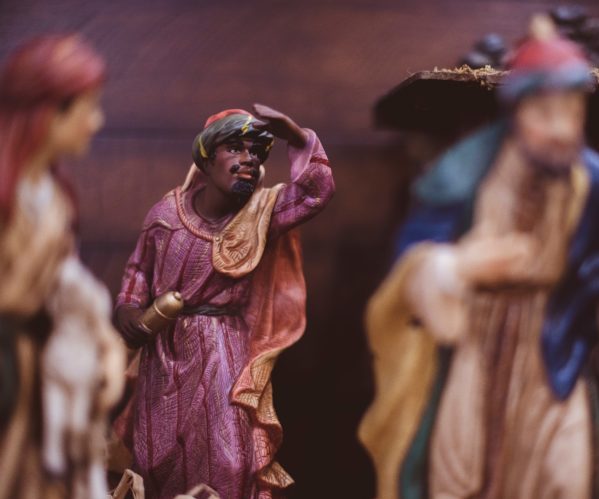
Right on time, my son’s mail-ordered Christmas gift arrives. I am happy. I am a cool dad here in America in the suburban town of German Town in Maryland. Among white people being a cool dad helps my blackness. The dead brown, snow-crusted UPS delivery truck leaves behind a hail of soft white smoke as I pick up the light box from the cold. I shake it, and the content rattles. In America, the packaging is always bigger than the content. That is what you pay for here, expensive big boxes that bear small gifts.
My son is still sleeping, so I have enough time to retrieve the remote controlled toy car, re-wrap it, and leave it under the Christmas tree, the way my grandmother left sacrifices by the bank Ikpoba river in the village. This gift will not be a huge surprise to my son because he was the one who chose it. We did not to go to the market together as father and son, like I did with my father every Christmas when I was his age. My son and I do not have to walk past women selling cooked rice and roasted yam or girls hawking moi-moi wrapped in scented leaves leaving sweet aromas in our senses. We do not have to walk the breadth and length of the teaming market, greeting known friends, uncles and aunties while looking for the best bargain in African wax print, which will be used to sew my shirt and trousers. I and my American son won’t even be talking about clothes this Christmas: all he wants is just this special toy. He saw it advertised first on the Disney Channel and later in a flyer that fell out of last Sunday’s Washington Post.
My son doesn’t need clothes for now; we have enough to open a Baby Gap store. He is not like me at his age. Buying new clothes for me was a once a year fanfare between I and my father or mother. Everything extravagant was once a year in Uwessan village. Nothing fun was multiplied. Eating rice was once a year, on Christmas day. Entering Mr. Dingo’s Peugeot 404 pickup to the market was once a year. The rest of the year we made the ten mile journey on foot to Uromi town. Shopping for shoes at Bata Supermarket was once a year. Primary school uniforms were supposed to last for six years as if one stopped growing the moment Papingo, the local tailor, darned us with our Primary 1 blue checkered shirt and brown khaki shorts uniforms.
***
My son is still sleeping. He doesn’t have to wake up and fill empty gourds with water in readiness for the long journey to the farm. American farms are not like the distant dusty ones I trekked to with my father on Christmas Eve to harvest yams for the next day’s elaborate cooking. Come snow or sunshine my son will get what he wants. He doesn’t have to worry about using his two-month-old toys. Two months in the life of an American toy is equivalent to a lifetime for the Nigerian handmade toy of my time. There is always a new toy in America even before you trash the wrap of the last one you purchased. My son has a red toy car with Superman painted on the hood, diving upside down. What he chose for Christmas is a yellow car with Ben Ten on it. Every day, America creates super heroes, meant to save the lives of our children and raid the accounts of the parents. I am a magician. I have to provide everything that is seen, pointed at, talked about or mentioned at a friend’s birthday party. So when he wakes up today, he will go straight to check his wrapped gift, which will have his name written boldly on the paisley wrapping paper.
My son’s heart doesn’t have to palpitate and wonder what lies inside the big package like I did with my father’s big wooden box. In America, I have a son but, I don’t have a wooden box like my father’s in the village. My closet reveals all my secrets like the torn brassiere of a mad woman. They call it walk-in closet. It costs extra money when buying a house here. American shirts, ties and shoes are on one side. And on another corner, African agbada, boubou and caftan form a committee of colored parachutes, collapsed and nicely segregated. I have no secret in America, no inner room that is dark and mysterious to my young son; he has total access to the house. Everything is in the open; the American child reduces his African father to a masquerade without a mask.
Besides the yellow Ben Ten toy car, my son is getting a suit. Not that he asked for it before I ordered it online a while back without krik or krak. A cool dad doesn’t wait for a son to ask before ordering. I entered his size, 5T, and five days later the box arrived, large enough to fit my Victoria Crown cab. Unlike me, he did not experience the thrill of Amos the village tailor’s measuring tape. He did not have to wait endlessly in reverence of the bale of African wax prints lining the tailor’s hanger in his stall. He did not have to fall asleep from the exhaustion of worshipping his new colorful Christmas attire. Village Christmas clothes were vibrant like a bougainvillea garden in full bloom. Purple. Red. Yellow. Lilac. My village Christmas clothes were happy hues. But my son’s suit is black and white, pinstriped like a zebra, an animal that is neither black nor white, neither horse nor ass like me, caught between my Africaness and Americaness.
It is time to wrap the toy car with a five-dollar-wrapping paper. I retrieve it from its casing. The toy I paid a sizable amount of money for is surprisingly small. This tiny combination of plastic and mere wires cost more than my uncle’s Volkswagen Beetle ten years after the Civil war aka Biafran war. But get this. My son’s toy is a motorized car with a shiny antenna and internal transmitter. It has headlamps, which a real car in my village cannot boast of. And God forbid that the American child ties a rope on a toy car and pulls it with his energy; this toy is equipped with a remote control. My son will neither feel the excruciating excitement of wandering through a village cocoyam farm in search of stems to make his own birdcage nor will he have to beg an adult to cut a branch of a tree for him so he could make a toy car. Cans and tins of Bournvita, Milo and Tomapep are meaningless to my American son. He doesn’t know that a clever hand can fashion a toy car from empty cans. But here in America, these cans and tins are recycled in a yellow container supplied by the government of Prince Georges’ County. If you put tins and cans in regular trash, you are accused of threatening the ozone layer. If you do not recycle bottles or papers you are toying with detonating an atomic bomb that could apocalyptically wipe out our beautiful and expensive universe.
***
The evening of my son’s Christmas Eve is chilly. The temperature has dipped to single digits. We may have to watch Carol Night on TV. There may be snow tonight. The meteorologist, such a fanciful name, whose annual salary is enough to rebuild Darfur, cannot make up his mind about it yet. He broadcasts what the computer or his producers tell him. “We may have a white Christmas,” he says excitedly but unsurely. I am already having a white Christmas snow or no snow.
My village native doctor and rainmaker, Oboh Epadinpadin Oke, who is not paid a penny, can take one look at the sky and predict a thunderstorm and be hundred percent accurate. He knows to consult the oracles before opening his tobacco and kola nut stained mouth. Not to disappoint waiting farmers, he knows to catch a bullfrog from a nearby pond, harvest a weeping willow and a wet snail to conjure the rain from the sky, even if the sky is dry. Primeval methodology has taught him that when a weeping willow emits water into fire and a bullfrog fights for life by the furnace, the gods will uncork their gourds of rain. But I cannot explain these things to my son the way my father explained them to me. I cannot explain my forefathers’ science to my America son. My reality is his magic. Tonight we will have to rely on the unreliable weatherman to keep guessing about our tomorrow. We will be holed up in our family room with no moon songs or folktales because there are no African grandmothers here, every old woman in America wants an injection of Botox and silicon implant and a trip to Vegas.
This frosty Christmas Eve, we will not go to midnight mass. Hopefully, my son will let me tell him all about my Christmas in the village. How the local catechist calibrated the ancient gaslight during midnight mass because even if we had hundreds and hundreds of Christmas lights, there was no electricity to power them. I just might tell him how excited we were to have the white Irish priest come to Uwessan village to say the Mass in Esan language and the village women would laugh all through the mass instead of saying the Novenas. Like a feared god, Fr. Kelly would be given all kinds of gifts, goats, chicken, egg, crates of Guinness stout and more. Then he would sprinkle holy water on our joyous faces and bless us in Latin spoken through a long nose. The entire village would help him load his Volkswagen Beetle and sing to him as his car disappeared into the forest on his way to the city.
I put my face on the dog-nosed coldness of the windowsill, checking the streets. The street is silent, except for the blinking lights in lawns. My neighbors’ Christmas lights are sad in the cold, not as happy as the harvest of fireflies back home. A Nativity scene illuminates the next neighbor’s grass; Mr. Choudry is not even a Christian. But who says Christmas is only for Christians in America?
***
My son comes out from his room, and I fix him a mug of hot chocolate. As he drinks thirstily and checks under the Christmas tree for packages. I scratch my head for a Christmas story to tell him.
We sit by the fake fireside and watch the blue/yellow flame with astonished eyes. Fire from gas not firewood — gas that I would pay for dearly in January even though I couldn’t roast a single yam in the fire it produced. Here you pay to get nothing, like paying for a big brown battered box that contains a tiny yellow toy car.
I decide on a storybook resting on the coffee table because I cannot conjure any tale in my head. I look at the pictures on the glossy storybook; Virgin Mary’s hair is neither wooly nor black. It does not even look anything close to Mary J. Blige’s peroxide blonde. Her hair is straight, silky. Her eyes are blue like the Atlantic Ocean on a clear tropical day. Like the Amex logo on the credit card I used to pay for my son’s toy car. Like the eyes of the consular officer that gave me American visa a million years ago in Lagos. Baby Jesus’ skin is pastel, almost like latter day Michael Jackson’s face: white, eyes blue too, unlike mine or my son’s deep brown eyes and thick eyelashes. Our eyelashes are the color of shoe brush dipped in Kiwi black polish.
I stare at the storybook and once again I am in my village. I close the book and tell my son about the Christmas I know. How on Christmas Eve the sound of my mother sifting stones from Ekpoma rice with a metal tray was like jazz to my ears. I tell him how I’d asked my mother one day, “How come rice always come with stones?” to which she replied, “Life will give you everything; it is left for you to separate the good from the bad.” I tell him that the aroma of tomatoes, pepper and onions ground on stone beats that of any five star restaurant’s stew in downtown Washington, D.C. I tell my son that the sound of clanging pots, pans and spoons on Christmas morning was our jingle bell. I tell him that the melody of diced onions hitting boiling palm oil is music comparable only to Miles Davis’ last concerto crashing into his quintet at the 1955 Newport Jazz Festival. I tell him the village’s mild harmattan that caresses my morning skin was not as wicked as this winter wind that dries my skin like kpanla fish. I tell my American son that the excitement of eating Christmas rice was enough to fill my stomach even before I dipped spoon into my aluminum plate.
My son has fallen asleep; his face glows from the illumination of the burning fire. His breathing is sound and steady. Slight beads of sweat man his worry-free forehead. This is his Christmas, and he is the chief priest. I am just an acolyte. Yesterday he told me he loved the lights around the tree, around the house and up on the roof outside. This year, I outdid Mr. Choudry in decorating my house. I laugh at the gigantic Christmas tree that has taken over my living room, the fragile ornaments and gift boxes underneath.
I take my sleeping son to his room; he has his own room because we are in America. The stuffed toys in his bed—Big Tigger, Winnie the Pooh and Scooby-Doo—are happier than I am in this cold place. The characters laugh, mocking my loneliness and near madness. I no longer sleep with my wife, her decision not mine. I stare back at the cartoon characters and threaten to roll them up like prayer mats when my son goes to Yale or Harvard and replace them with Aso-oke or Kente. I have become a cartoon character in America.
I fix a glass of milk for Santa. Back in Nigeria, we know him as Father Christmas. I take a bite from the Oreo cookies meant for Santa. Tomorrow I will tell my son that Santa ate the Oreo; teaching children how to lie starts early in America. He must not know that Santa does not exist, nor does the tooth fairy who left five dollars under his pillow last month. I will never burst his bubble because my father never told me that there were humans inside the wailing masquerades that sent chills all over my body. So I will tell him that Santa climbed down the chimney to drink the two percent milk and fat-free Oreo cookies. Even in apartments that have neither fireplace nor chimney, American fathers will tell their children that Santa came down the chimney to eat cookies and drink milk.
***
It is Christmas morning. I am wake to the screeching of the alarm clock. I have never liked this intruder, so I snap it shut.
It is Christmas morning, but there are no clanging of pots or washing of plates. No roosters or goats protesting their tethering or their owners’ rapiers. There are no neighbors blasting Voices of The Cross from cassette players. Here, everything is frozen into silence. Soon I will go thaw the Christmas groceries from the African stores. The origin of the goats and chicken and pig feet are unknown, but they are good enough to remind one of home meat, no matter how tasteless.
I struggle out of bed, alone. My son is still sleeping in his room. His mother is doing a double shift; she is a nurse fully dedicated to making money not family. Christmas Eve/Day draws double pay for the immigrant worker to send home via Western Union. I walk to my bedroom window and pull the curtains apart. It is white outside. Even the distant rail tracks are buried in whiteness. My grass is the color of a deep freezer, frozen. Icicles weep from my roof top. It is white Christmas quite alright. My son’s country loves white Christmas and so does he. I stare deep into the mixture of sunlight and pastiness, and my eyes get misty.
Neighbors are already clearing snow from their walkways. Looking at the accumulated snow, I remember Uncle Usifoh, weaving the stem of an elephant grass caught in a monsoon wind along the village path, a stick of Benson & Hedges cigarette trembling in his Christmas morning lips and a song blasting from the side of his mouth despite the cigarette there—a trick he knew we liked. He often came to help my father roast the pig we bought for Christmas. The chasing of the festival pig was a feast for us the children. Preparation of Christmas meat was a communal effort. But before Uncle Usifoh got to my father’s doorstep, Mr. Jerome from Benin City would have traditionally waylaid him with a bottle of Aromatic Schnapps to set the morning right and kick off Christ’s birthday.
I remember me and my friends as children donning our new Christmas attires. We looked like a farm of sunflowers: of roses and of lilies in a valley. We would wear tinted plastic sunglasses with red rims. We would wear plastic wristwatches with blue and green and purple bands. Though our new shoes and sandals were already dusty, we would soak the morning in laughter and sing local songs towards our destinations. My grandmother would hail my little sister and sing to her beauty. She would smile and join her group of friends.
The spoiler of joy was a boy nicknamed Okuta. He was the village bully who did not take a bath even on Christmas day. He was not interested in new clothes. He was a sadist. His jigger infested legs were a dust magnet. He would wait patiently for innocent travelers. The village bully had no friends on a Christmas morning. He would set a trap for the weakest and loneliest child; he robbed children of their gifts of money, balloons, Fanta and Coke. In America, he would have had his day in a juvenile court.
Towards evening on Christmas day, after the masquerades performed new songs and dance steps, a goat that survived the Christmas onslaught would scratch its itchy back on my grandfather’s old mud shrine as if thanking the gods for a new lease on life. From the shrine, an ancestral green snake would slither past the goat on its way to seek eggs. The gentle harmattan breeze would stroke and shake down dead leaves from our pear tree. I would look at the long stretch of my father’s compound, and the sun’s mirages would rise from the earth in happy shadows. I would be returning home after visiting uncles and aunties, my pockets jingling with shiny coins, counting my blessings. Uncle Ephraim the police inspector gave me ten kobo. Aunty Okema who had a provision store gave me 20 kobo. But Okuta’s trap would be waiting for me at a bend in the road, not too far from Aunty Vero’s new house. My six-year-old legs knew it was time to borrow wings from the God of Fr Kelly and run for my dear life. I wouldn’t look back to seek my nine-year-old cousin George’s protection because he had died the previous year of measles. Okuta would chase me through my grandfather’s threshold into the waiting arms of my father. My father’s eyes would repel him like a dose of Gamalin 20 on cocoa weevils. I would be laughing nervously with the coins held tightly in my pocket and my new shoes eating away at my big toes. We learnt survival on the streets without the police guarding us.
I feel a tug on my thermo wear bringing me back to America. It is my son. He is awake and ready for his breakfast of cereal to be taken with two percent milk. In the village, my breakfast was a plate of steaming rice on Christmas morning. I pick him up and part the curtain wider for him to see the truth of the weatherman’s predictions; to see his white Christmas. My son smiles. His face lights up like mine when I got my first pair of shoes on a Christmas day from my father. The white snow makes him happier than the yellow toy car I had gotten him.
This is his Christmas, his feast and I am just a reluctant partaker.
“This is so cool daddy,” he declares.
********


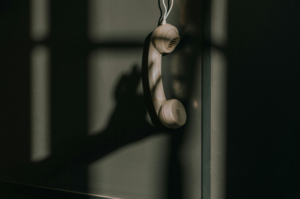
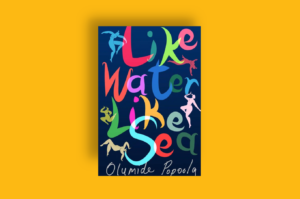
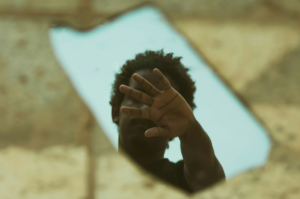

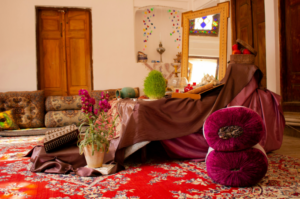
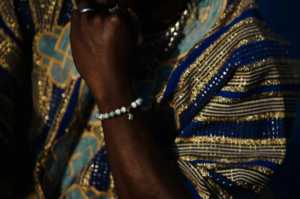

Paschalyne December 23, 2017 06:33
Wow. Just Wow.